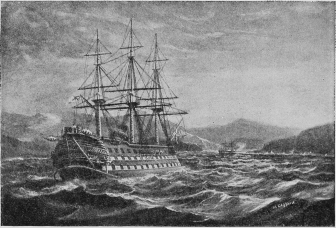Some illustrationshave been moved from mid-paragraph for ease of reading. In certain versions of this etext, in certain browsers,clicking on this symbol (etext transcriber’s note) |

![]()

H.M.S. Agamemnon entering Valentia Bay with firstAtlantic Cable.Frontispiece.
THE STORY OF THE
ATLANTIC CABLE
BY
CHARLES BRIGHT
F. R. S. E., A. M. Inst. C. E., M. I. E. E.
AUTHOR OF SUBMARINE TELEGRAPHS, SCIENCE AND ENGINEERING
DURING THE VICTORIAN ERA, THE EVOLUTION OF THE
ELECTRIC TELEGRAPH, 1837-1897, THE LIFE STORY
OF SIR CHARLES TILSTON BRIGHT
WITH FIFTY-FOUR ILLUSTRATIONS
NEW YORK
D. APPLETON AND COMPANY
1903
Copyright, 1903, by
D. APPLETON AND COMPANY
Published November, 1903
PREFATORY NOTE
THE jubilee of Submarine Telegraphy having lately been achieved, andthat connected with the Atlantic cable being somewhat close at hand, ithas been thought a suitable moment for the appearance of this littlevolume.
In these days when the substitution of submarine cables by wirelesstelegraphy systems is a subject of common talk, it may be well to pausefor a moment and contemplate the period of time covered by the gradualevolution of old and existing methods which at length achieved theresult we now enjoy—a practical commercial telegraphic system betweenall the nations of the world, and notably between the United Kingdom andAmerica.
By a somewhat curious coincidence the engineer of the first Atlanticcable accomplished his achievement at practically the same youthful age(twenty-six) as Mr. Marconi when first transmitting signals across theAtlantic without any intervening wires.
C. B.
21 Old Queen Street, Westminster, S. W.,
October, 1903.